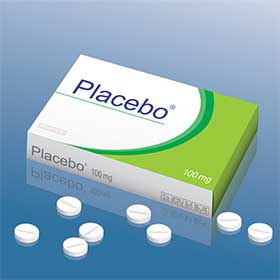
Could Homeopathic Remedies For Dogs Be Dangerous?
Depending on what you know about homeopathic remedies for dogs you might believe they are a holistic medicine for dogs, natural or herbal remedies for dogs, or even an alternative veterinary treatment that has proven results.
Alternately, you might be skeptical about the benefits that are claimed for homeopathy for dogs, or humans for that matter. It's only reasonable that you would want to see real evidence that it works before using it to treat your dog.
What Is It, How Does It Work, And Is Homeopathy For Dogs Effective?
In this article we'll define homeopathy so we have a common understanding of what it is, take a look at how homeopathy works, and provide information to help you decide if it is right for your dog.
There is a lot of confusion and misinformation out there so let's start start to define homeopathy and go back to the beginnings of it's development.

pagnacco / stock.adobe.com
Homeopathic "medicine" is commonly sold as a liquid (in drops or spray form) or in little white sugar balls. The solution is sequentially diluted with vigorous shaking between stages. It is claimed that the agitation causes the structure of the original molecules to be ingrained in the memory of the water.
What Is Homeopathy And Where Did It Originate?
It may go back as far as 400 BC to Hippocrates (widely known for his namesake, the "Hippocratic Oath" for doctors). Much later contributions to the line of reasoning underlying homeopathy would come from Philippus von Hohenheim (Paracelsus) in the 16th century. He is regarded as the father of toxicology and observed effects of various doses noting, "the dose makes the poison." However, Hippocrates and Paracelsus only laid the groundwork for what would later become what we now know as "homeopathy."
It could be said that the founder or "father of homeopathy" was the German physician Samuel Hahnemann (1755—1843). He believed that living creatures had an underlying spiritual "energy" and that disease could be caused by disturbances of the "vital force" as well as by physical causes.
While translating the work of William Cullen, a Scottish physician and chemist, Hahnemann disagreed with Cullen's theory about the ability of the Cinchona plant to cure malaria. Out of this disagreement much of what we now know as homeopathy may have arisen.
Hahnemann tried the bark of the Cinchona plant himself and noted the similarities between the effects of the bark and the symptoms of malaria (joint pain, shivering, and fever). He believed the successful treatment was due to this similarity and that drugs that cause the same symptoms as the disease are really what affect a cure, or as his famous adage goes, "Like Cures Like."
Of course, this was completely wrong! The real reason the Cinchona bark remedy worked was because it contained quinine—which kills the parasite that causes malaria and not because it induced the same symptoms. It is upon this failure of reason that the entire foundation of homeopathy is built.
Less Is More With Homeopathic Treatments
We've only just skimmed the surface of homeopathy (let alone actual homeopathic remedies for dogs) and we can already see cracks in the foundation. Why would such an inauspicious beginning give rise to a billion dollar industry?
One of the best things homeopathy had going for it was that it didn't work. Considering the state of medical science at the time, patients were often dying from the outrageous "medical treatments" on offer. Often one would do better by not seeing a physician or surgeon at all. That's were homeopathy was really able to shine and got it's big break. It was as good as doing nothing and patients receiving homeopathic treatments would actually fair better when compared to those who subjected themselves to the horrors of what passed for the modern medicine of the day.
Homeopathic Dilutions
You may have heard that homeopathic remedies use highly diluted solutions, but just how dilute are they?
There are several dilution scales but for our purposes let's look at a common one that you are likely to see listed on any homeopathic remedies for dogs that you might find online or at a local retail outlet.
While some homeopathic practitioners prefer lower dilutions more akin to allowing for active ingredients, as medicines do, it is more common to find dilutions that all but eliminate the active ingredient—and some that actually do.
The "C Scale" or "centesimal scale" is a 1 to a 100 dilution at each stage. The "at each stage" part of that sentence is very important. The first stage would be to dilute an ingredient to 1 part per 100. The second stage involves taking that solution and diluting it again into 1 part per 100. At this stage (2C) you would have a 1/10,000 dilution.
This is just the beginning of how dilute homeopathic remedies can get. 3C is a factor of one part per million (10-6). It is common to find 6C or even 30C dilutions. What does that mean?
A 6C dilution is a factor of 10-12. That's one part in one trillion or 1/1,000,000,000,000.
As extreme as that is, a 12C dilution is the greatest dilution that you could expect to possibly find even one molecule of the original ingredient. That's right, 10-24. A 1 followed by 24 zeros. 1/1,000,000,000,000,000,000,000,000
Now that's dilute! It's as dilute as you can get before you are left with nothing…
13C is the cut-off point where you would no longer be able to find even a single molecule of the original ingredient if pure water was used as the diluent. However, you can easily find 30C (10-60) on products available for sale. How dilute is 30C? A common illustration of what a 30C dilution would look like says, "this would require giving two billion doses per second to six billion people for 4 billion years to deliver a single molecule of the original material to any patient."
This makes it clear that homeopathic remedies for dogs, or people for that matter, cannot work. There is no valid evidence that it can work from the fields of chemistry, physics, mathematics, or medicine. This is also why homeopathic product manufacturers and retailers can confidently state that there are no homeopathy side effects. At least that is, no more side effects from homeopathy than would come from what it is diluted with, which is often just water.
Homeopathic "Water Memory"

freshidea / stock.adobe.com
In spite of overwhelming scientific evidence that homeopathy not only does not work, but cannot work, homeopaths cling to the story that it does, and that the more dilute something is the more potent it is, and that something called "water memory" accounts for why it works—even if there is no active ingredient remaining in the solution.
Supposedly, even though the solution does not contain any of the the original active ingredient—not even a single molecule—somehow, magically, the water retains a "memory" of the homeopathic ingredient that was in it. Of course, there is no evidence for this either—which seems to be a common theme in homeopathy.
Let's pretend for a moment that "water memory" is a real thing. What about everything else that has come in contact with that water like sewage systems, water treatment plants, and the pipes that bring it to the tap? (Don't get the people of Flint, Michigan started on that!) Does water keep a "memory" of all that too; or just the good homeopathic stuff?
Keep in mind that the water that exists today is the same water that has been on Earth since the beginning. Charles Fisherman, author of The Big Thirst: The Secret Life and Turbulent Future of Water, says "All the water on Earth has been through a dinosaur kidney."
That's right, all water, including all the water you drank in the past or ever will drink in the future, has been dinosaur pee at one time or another, and since then the same water has just been recycled through every animal and person that has ever lived.
Luckily, "water memory" is not true in this sense and once those contaminants are filtered out you are left with water—just water, without memories of dinosaurs past.
What About Claims That Homeopathic Remedies Work?
Some people would no doubt object and say that a homeopathic remedy has worked wonders for them or someone they know. How can you account for the rave reviews and five star ratings of these products? Perhaps it's too soon to write off homeopathic remedies for dogs(?)
There are several reasons why it may appear that homeopathic treatments work. It is a well known fact that the mind can have a powerful effect on whether or not a person gets well. The mind can even cause disorders that result in illness. Knowing this, medical doctors have prescribed "placebo" drugs. These are drugs that don't have any real medicinal ingredients. They work because the patient believes that they will work.
This "placebo effect" can go a long way to alleviating symptoms but it has its limits. It might help to change the focus of a patient from signs that they are sick and getting sicker to an expectation of healing where they instead look for signs of well-being and actually do feel better. On the other hand, it won't stop something like an aggressive bacterial infection that requires real drugs like antibiotics to be effective.
One of the ways in which homeopathic treatments can be more dangerous than doing nothing is if they cause someone to delay or refuse appropriate medical treatment.

Peter Hermes Furian / stock.adobe.com
Homeopathic remedies for dogs are not likely to work as the "placebo effect" does not work on dogs without prior conditioning.
The placebo effect is one of the primary ways people trick themselves into believing that homeopathy works for other things. If someone is having trouble falling asleep and they try a homeopathic sleep remedy it may actually have the desired effect. However, an important aspect of the placebo effect is that people have to actually believe it will work.
Dogs don't know that the stuff you are giving them is supposed to treat them for a given condition. Homeopathic remedies for dogs do not work because the placebo effect does not work on them.
While some will insist that the placebo effect does work on dogs the examples I've seen don't apply in the case of giving homeopathic remedies for dogs and isn't really the placebo effect as it's generally understood and would require a dedicated program of behavioral conditioning to get it to work.
In the case of a dog who is undergoing a painful veterinary procedure or is suffering due to an illness it has been demonstrated that the presence of a loving, trusted owner who calms and comforts the dog can have a positive effect and helps aid recovery. I have no doubt that this could be beneficial provided the owner is having a calming and reassuring effect rather than adding anxiety and nervous energy to an already stressful situation.
If one were to give their dog a homeopathic treatment and all the while pet their dog reassuringly, speak in a calm manner, and do what they could to make them feel better, it would be those things—and not the homeopathic treatment—that benefited them.
In another case, dogs suffering from separation anxiety were first given a real anti-anxiety medication. This helped to actually calm them down and started the process of behavioral conditioning. First they get the pill, then they feel better. This is repeated until the real pill is switched with an inert sugar pill. However, since the dog now has a conditioned expectation to feel calmer after it is given a pill, it works.
Of course, in order for this to be successful you first have to give your dog a real medicine that actually works (ie. not a homeopathic treatment). I suppose, once the dog is conditioned with the real medicine you could switch to a homeopathic pill and in this way it could be claimed that homeopathic remedies for dogs can work as placebos. But it's a long way to go, and why would you want to switch from a medicine that is really helping your dog to a homeopathic remedy that can only work as well as behavioral conditioning allows (remember, it won't work on real diseases for long, if at all), and probably costs as much or more than the real thing?
Confirmation Bias To The Rescue of Homeopathy
There are other reasons people might believe homeopathy works for them and they risk making the same mistake when evaluating homeopathy for dogs. Most of these come under the heading of "confirmation bias." Any positive result gets falsely credited to homeopathy while no change or negative results are ignored or explained away.
Illnesses, including chronic illnesses can go in cycles relating to the disease progression, environmental factors, stress, etc. It is usually when things get worse that a treatment is sought out. If this means going to a homeopathic practitioner the treatment will be determined and the remedy taken at the peak (or near the peak) of the distress.
Then the illness may improve and lessen, as it would have anyway, given its normal cycle. Unfortunately, the patient links the improvement to the homeopathy.
Similarly, the homeopathic treatment may be taken in conjunction with a real medical treatment. When things get better the homeopathy gets undeserved credit for a role in the recovery.
Sometimes illnesses get better on their own and would have regardless. Again, homeopathy gets credit where none is earned.
The Danger Of Confirmation Bias
One can see confirmation bias at work in a UK study done about homeopathic remedies for dogs. The double-blind placebo-controlled study into the efficacy of a homeopathic remedy for fear of firework noises in the dog (Canis familiaris) showed that owners of dogs given the placebo rated their dogs as having improved in 14/15 behavioral signs of fear and only a slight difference of 15/15 in the group that was given the homeopathic treatment. From the study abstract, "However, there was no significant difference in the response seen between the two treatment groups."
So one group was given a placebo that did nothing. The other group was given a homeopathic treatment (which we know also does nothing). However, both groups of owners ascribed almost identical dramatic improvements. That is how confirmation bias works. The owners saw what they wanted to see or what they thought they were supposed to see.
Imagine a dog that is sick whose owner gives them a homeopathic remedy and imagines the dog is getting better and with confirmation bias convinces themselves that the dog is indeed improving while ignoring signs to the contrary. This kind of thinking doesn't end well for the dog.
Homeopathic Remedies For Dogs Versus Herbal Remedies

marrakeshh / stock.adobe.com
Herbal remedies are very different than homeopathic remedies for dogs and you should consult with your veterinarian before giving them to your pet.
Homeopathy for dogs should not be confused with herbal remedies for dogs. Someone might be interested in finding natural remedies for dogs and mistakenly lump them all together. However, some so-called "homeopathic medicine for dogs" will contain both homeopathic and herbal components. If they have a positive effect it is from the herbal ingredients. Unfortunately, this is another way that homeopathic treatments get credit for working when it was the herbal ingredients, if anything, that deserves the credit.
Herbal remedies can contain enough of the active ingredient to have a very real medicinal effect. In fact, they can have drug interactions with prescribed medications and you should consult with your vet if you are using, or plan on using, any "natural" or "herbal" remedies.
Herbal remedies can be for specific problems or provide general health support and actually be effective.
Since Some Vets Offer Homeopathic Remedies For Dogs Doesn't That Mean Homeopathy Is Effective?
I was dismayed to find that some vets are even offering homeopathic remedies for dogs! I don't want to ascribe this to dishonesty but perhaps to a recognition that veterinarians are, after all, running businesses and they may just be succumbing to market demand in order to help boost revenues. In some cases they may have even bought-in to the unproven, pseudo-science claims of homeopathy.
They may reason that it doesn't really hurt the dogs (or other pets) as homeopathy doesn't really do anything, and that they can make sure the dogs are also getting real treatment while making the owners who insist on trying homeopathy happy (albeit lighter in the wallet).
The Takeaway About Homeopathy For Dogs
While there is much more to be said about homeopathy for dogs I didn't think this article was going to get this long. Long story short…
- Homeopathy may work for some people through the placebo effect.
- The placebo effect doesn't really work on dogs (not without prior behavioral conditioning).
- Therefore, homeopathy for dogs does not work.
I'm sure this article will garner me a few haters. Advocates of homeopathic treatments will insist that it works in spite of mountains of evidence to the contrary. However, my concern is for the health and well-being of the dogs who can't speak for themselves, who may have owners who are using homeopathy and convincing themselves that it really is working as a preventable and maybe even curable illness takes an ever mounting toll.
Have Dog Training Questions?
Check out these introductory dog training videos...
I want my dog to stop being aggressive.
I want some help training my new puppy.
I want my dog to stop barking at everything.
Get Australian Shepherd Info, Website Updates, Special Offers, and Cartoons...
FREE GIFT
You'll also receive a free copy of the ebook
My Everyday Dog Training Tools
by professional dog trainer Daniel Abdelnoor, "Doggy Dan"










 Loading Image...
Loading Image...